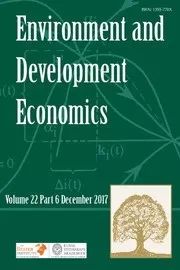时间:2017-10-30

天津大学管理与经济学部张增凯博士和天津大学马寅初经济学院卓越教授、院长张中祥合作的文章“中间产品关联与碳泄露”(Intermediate input linkage and carbon leakage), 近期在在剑桥大学出版社出版的Environment and Development Economics上正式发表,刊登在卷22,2017年,725-746页。

(于2017年8月中国社会科学院组织的首届气候变化经济学学术研讨会。张中祥作大会主旨报告,张增凯获优秀论文一等奖)
差异化政策引起产业竞争力与碳泄露的顾虑。已有很多国家、区域间碳泄露的研究。而被约束企业碳减排可能会被其他行业碳排放的增长所抵消,即国家、区域内部门间存在碳泄漏,但鲜见这方面的研究。
考虑到高能耗企业的产品大部分被应用到其他行业的生产过程中,这篇文章从部门中间产品关联入手,试图从理论和实证两个维度澄清产业关联对于碳泄漏的影响机理。本文首先基于均衡理论构建了考虑中间品投入的理论分析模型,从理论上分解出规模效应、消费替代效应、生产替代效应和乘数效应对碳泄露的影响并给出了解析解,进而澄清产业关联关系对环境政策对应碳泄漏的影响机理,发现生产替代效应和乘数效应与产业关联关系密切相关。
考虑到即将启动的全国碳排放交易体系必将纳入电力行业,而电力作为中间品投入被广泛应用于其他行业的生产过程中,所以在分析电力部门碳减排政策实施效果的过程中需要考虑产业关联关系的影响。本文构建了中国可计算一般均衡模型,分析了电力行业碳排放约束对应的碳泄漏问题。研究发现,电力部门的碳减排约束不仅会推动电力部门碳排放下降,而且对其他部门的碳排放量的下降也有促进作用,这其中产业关联功不可没。
1996年创刊的Environment and Development Economics一直由剑桥大学出版社出版,2004年起出版从一年四期增至六期,每期收录大约6篇文章。
文章全文参见链接:https://doi.org/10.1017/S1355770X17000250
Intermediate Input Linkage and Carbon Leakage
Zengkai Zhang, ZhongXiang Zhang
Climate regulations tend to target energy-intensive sectors whose products are widely used in industrial production as intermediate inputs, and carbon abatement may be partially offset by intermediate input-led leakage. This paper aims to examine the impact of intermediate input linkages on carbon leakage both theoretically and empirically. The theoretical part develops a Harberger-type model with an input-output linkage structure, identifies four leakage effects and derives closed-form solutions for these leakage effects. Its empirical part builds a computable general equilibrium model of China's economy and introduces structural decomposition analysis to link the theoretical and empirical models. When imposing a carbon price on the electricity generation sector, our results show significant sectoral carbon leakage. Our decomposition analysis further suggests that such leakage is mainly through the production substitution effect and the multiplier effect. Our results highlight the importance of sectoral linkage when discussing the carbon leakage issue of climate policies.
JEL classifications
Q55; Q58; Q43; Q48; O13; O31; O33; O44; F18
Keywords
Carbon leakage; Sectoral linkage; Climate regulation; General equilibrium model; Production substitution effect; Multiplier effect